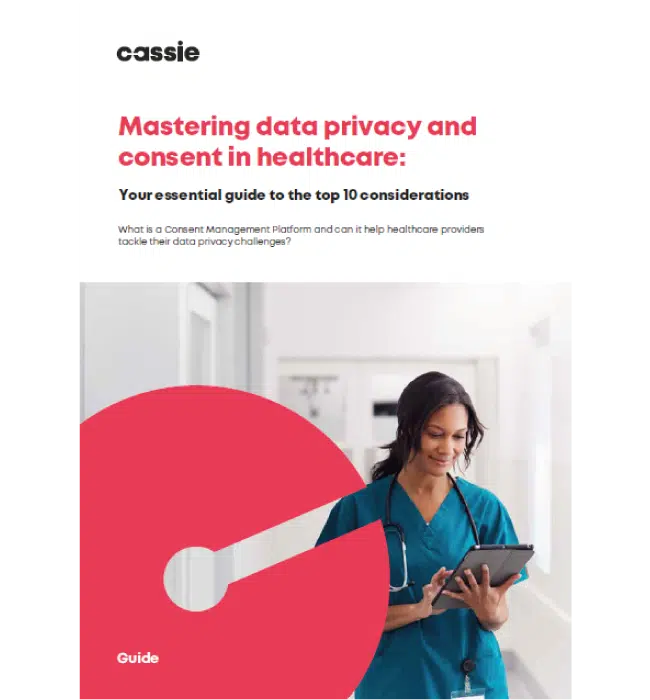Is tech making healthcare, data privacy and patient consent better or worse?
Posted: January 28, 2023
The use of technology in healthcare has revolutionized the way medical professionals diagnose and treat patients. From electronic health records to robotic surgery to telemedicine, it’s clear that technology is playing an increasingly important role.
How does technology better the healthcare sector?
Improved access to patient data, consent and privacy settings through digital platforms
Healthcare providers have become increasingly reliant on digital platforms to store, access and share patient information. The rise in the use of digital tools has created an urgent need for Consent Management Platforms (CMP) to ensure patient data is collected and used securely. CMPs allow healthcare organizations to record patient consent, set up privacy settings for data sharing, and manage access to patient records.
Use of Artificial Intelligence for faster diagnosis and treatments
With the help of Artificial Intelligence (AI) healthcare providers can quickly identify patterns and trends in patient health data, allowing for faster diagnosis and treatments. AI-powered machine learning algorithms are being used to improve medical imaging accuracy, automate administrative tasks such as scheduling appointments, and provide targeted insights into disease management. By leveraging the power of AI, healthcare providers are able to improve patient outcomes and reduce costs.
Automated reminders and notifications for appointments
Digital tools are also being used to automate reminders and notifications for appointments, medications, treatments and other healthcare-related tasks. By sending automated reminders, healthcare organizations can reduce the number of missed appointments and ensure patients receive timely care.
Telemedicine allows remote consultation with specialists from any location
Telemedicine is becoming increasingly popular, providing individuals with access to specialist care from any location. Through telemedicine, patients can speak to a healthcare professional over the phone or video call and receive personalized advice on their health concerns. Telemedicine also helps reduce appointment wait times and make healthcare more efficient and accessible.
Connected medical devices that monitor patients’ health
Connected medical devices such as sensors and wearables are being used to monitor patient health in real-time. These devices allow healthcare providers to track vital signs, detect early warning signs of illness, and remotely monitor patients with chronic conditions. By using connected medical devices, healthcare organizations can more effectively manage patient care and reduce hospital visits.
Streamlining administrative tasks
Digital tools are being used to streamline administrative tasks such as billing and filing insurance claims. By automating these processes, healthcare organizations can reduce paperwork and make it easier for patients to pay their bills. Digital tools can also be used to keep track of patient records and ensure that all the necessary data is collected in a timely manner.
The disadvantages of technology in healthcare
Increased potential for medical errors
As technology becomes increasingly sophisticated, there is a growing risk of medical errors due to incorrect data entry or misinterpreting diagnostic results. In some cases, these errors can have serious consequences such as incorrect medication dosage or misdiagnosis of conditions.
Increased costs of technology
Another disadvantage of technology in healthcare is the cost associated with implementation and maintenance: high initial costs of purchasing new equipment, installation fees, cyber security protection, software licensing fees and staff training all add to the overall burden on the healthcare system.
Difficulty in integrating existing healthcare systems with new technology
Integrating new technology with existing systems can be difficult, leading to data incompatibility, system breakdowns and a lack of standardization between different healthcare providers. New technologies may also be difficult to use and require additional staff training.
Unreliable or outdated software leading to security vulnerabilities
Outdated software can create security vulnerabilities which can lead to data breaches or malicious attacks. Unreliable software may also lead to incorrect diagnoses and other medical errors, as well as a loss of confidence in the healthcare system.
Technology in healthcare: unlocking new opportunities or creating new problems
Technology in healthcare has a range of benefits, from improving patient outcomes to making medical staff more efficient and effective. However, it also carries risks such as cyber-security threats, privacy concerns, and the potential for misuse or abuse by those who don’t understand its capabilities.
It is important that digital health tools are developed with safety protocols built in at every stage of implementation so that everyone can benefit from their use without compromising security or privacy. With appropriate safeguards put into place, technology can revolutionize healthcare and ensure better care for all patients around the world.
Want to learn more about the evolution of data privacy in healthcare?
Consent Management Platforms offer a viable solution for healthcare providers to comply with the stringent regulations laid out by HIPAA, ensuring the safe and confidential handling of all patient data.
- Achieve comprehensive compliance with HIPAA regulations
- Securely store patients’ personal data
- Create a detailed audit trail for all access permissions and modifications
- Offer a convenient method for securely tracking, managing, and sharing sensitive data
- Enhance the understanding of how patient data is utilized and ensure its appropriate use.
To discover how Cassie can assist healthcare providers in surpassing their compliance goals and achieving advanced levels of connected care, take a look at our healthcare sector case study.

Mastering data privacy and consent in healthcare: Your essential guide to the top 10 considerations
Gain a thorough understanding of healthcare data privacy and consent with our comprehensive guide, “Mastering data privacy and consent in healthcare: Your essential guide to the top 10 considerations.” Explore how a Consent Management Platform can assist healthcare providers in overcoming data privacy challenges.
Download the guide now to take the first step towards enabling your organizations data privacy and consent journey.

